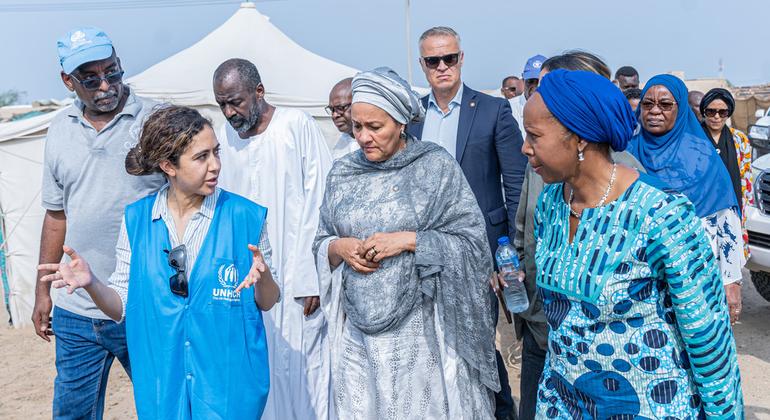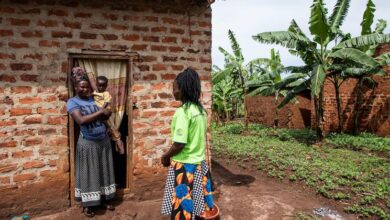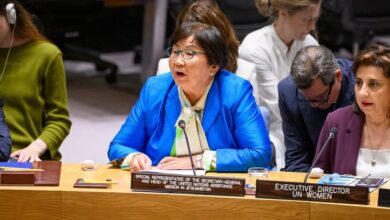UN Deputy Secretary-General calls for global solidarity as crisis rages in East Africa

Chad hosts more than 1.1 million refugees, many of them fleeing violence in Sudan, where rival military forces have been fighting since April 2023. At the same time, the war has also caused enormous suffering within Sudan’s borders.
“The humanitarian mission we have in Sudan is huge,” said the UN Deputy Secretary-General. Amina Mohammed speak. “We have been continuously supporting the government in trying to resolve the crisis. The suffering of the people in this country is one of the the worst crises in the world today“ .

Hundreds of thousands of people in Sudan have been affected by heavy rains and flash floods since June.
Ms Mohammed met with officials in Chad and announced a $5 million allocation from the United Nations. Central Emergency Response Fund (CERF) as part of a rapid response towards supporting flood recovery these efforts, UN Spokesperson Stéphane Dujarric told reporters at UN Headquarters on Friday.
Area in crisis
Chad and neighboring Sudan are struggling with multiple crises. These include the ongoing Sudanese war and recent floods affecting 960,000 people in Chad And 310,000 in Sudanaccording to United Nations agencies.
Discussions between the UN deputy secretary-general and local authorities in Chad focused on the complex challenges facing the country, including regional dynamics and key risks, and highlighted the “urgent need for global solidarity”, a UN spokesperson said.
Reaffirming the UN’s commitment, Ms Mohammed called for “solidarity and maximum resources” to ensure the humanitarian response accomplishes its mission and supports people in the region, and urged parties to “invest more in saving lives and livelihoods”.
‘Lifeline vital for delivering aid’
While in Chad, Ms. Mohammed observed the humanitarian corridor in action in the newly opened area. Adré Intersection into Sudan and met with refugee representatives, women, youth and community leaders, welcoming the recent opening as “a positive step” towards delivering life-saving aid in Sudan.
“This crossing is a vital lifeline for delivering aid to millions of people in Sudan and must remain open and accessible to facilitate large-scale humanitarian assistance while ensuring the safety of aid workers,” the UN Spokesperson said.
Closed for a year, the humanitarian corridor will allow UN agencies to scale up assistance to 14 famine-hit areas in Darfur, Kordofan, Khartoum and Al Jazirah.

UN Deputy Secretary-General Amina Mohammed (right) visits Adré, Chad, at the border crossing with Sudan.
‘We need resources now’
The UN Deputy Secretary-General stressed the importance of keeping border crossings open at all times.
The Adré border crossing is the most efficient and shortest route to deliver humanitarian aid into Sudan – and specifically the Darfur region – at the scale and speed needed to respond to the severe famine crisis.
“What we have to do is balance opening the borders with the aid that comes in, which is resources, so we need those resources and we need them now,” she stressed.
The United Nations’ $2.7 billion appeal is only 41 percent funded.
Sudan: War, displacement and famine
Across the border, in Sudan, food security experts newly declared that the war has pushed parts of North Darfur state of being faminespecifically Zamzam campwhere more than half a million displaced people are taking shelter.
The suffering of the people in this country is one of the worst crises in the world today.
Some 25.6 million people — more than half of Sudan’s population — face severe famine, including more than 755,000 people on the brink of famine and an estimated 10.7 million people currently internally displaced, according to United Nations Agencies.
During a visit to Sudan earlier this week, Ms Mohammed met with the country’s president and cabinet members, who agreed that the Jeddah peace process must move forward quickly. She stressed that “there is consensus there, and there is no reason why it cannot move forward”.
However, the discussion focused mainly on the humanitarian agenda and “the urgency of this issue,” she told reporters at a press conference in Port Sudan on Thursday.
She said efforts were being made to address the legitimate concerns of the Sudanese government and establish procedures “that will ensure this aid reaches the right people”.

UN Deputy Secretary-General Amina Mohammed visits a UNICEF-supported e-learning centre at the Abdullah Naji site for displaced people in Port Sudan.
‘Crisis around hunger’
“We are facing a famine crisis,” said Mohammed. “We are not getting medical supplies where there is a health crisis. But more importantly, we have to remember the suffering of the people, and we are here to do that with the government of Sudan.”
Mrs. Mohammed met with the evacuees, United Nations Team as well as with some government officials.
“What we did was sit down with the humanitarian aid committee, and then we discussed how, first of all, we would not stop any of the aid that is currently in place,” she explained.




